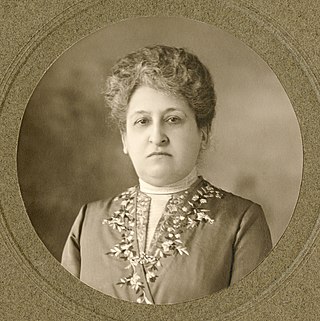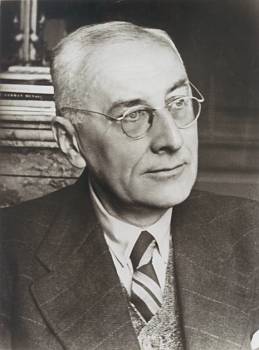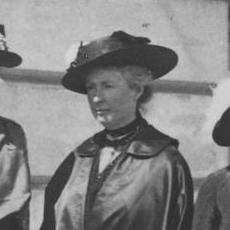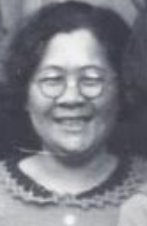
Aletta Henriëtte Jacobs was a Dutch physician and women's suffrage activist. As the first woman officially to attend a Dutch university, she became one of the first female physicians in the Netherlands. In 1882, she founded the world's first birth control clinic and was a leader in both the Dutch and international women's movements. She led campaigns aimed at deregulating prostitution, improving women's working conditions, promoting peace and calling for women's right to vote.
The International Association of Women in Radio and Television (IAWRT) is a women's organization involved in the broadcasting industry. The organisation of professional women working in media or educating about electronic and allied media, has a mission to strengthen initiatives which ensure women’s views and values are integral to media programming and to advance the impact of women in media.
The European Feminist Forum (EFF) was a web-based space for dialogue for feminists in Europe. Launched in April 2007, EFF served as an initiative to create dialogue and incite change in Europe. The site was available in English, Spanish, French and Russian languages. EFF was created by eight different feminist networks in Europe. EFF was non-hierarchical and invited individuals to steer the conversation on the forum. The website went offline after approximately five years of existence.

Nicolaas Wilhelmus Posthumus or N.W. Posthumus was a Dutch economic historian, political scientist, and professor at Erasmus University Rotterdam.
Feminism in the Netherlands began as part of the first-wave feminism movement during the 19th century. Later, the struggles of second-wave feminism in the Netherlands mirrored developments in the women's rights movement in other Western countries. Women in the Netherlands still have an open discussion about how to improve remaining imbalances and injustices they face as women.
Mapping the World of Women's Information Services is an online database of women's information centres, libraries and archives. It was developed in 1998 in the Netherlands by the International Information Centre and Archives for the Women's Movement (IIAV) in collaboration with the Royal Tropical Institute, and Oxfam, GB, with a grant from UNESCO. Presently Atria, institute on gender equality and women's history, the successor of the IIAV, maintains the database.

Rosette Susanna "Rosa" Manus (Dutch pronunciation:[roːˈsɛtəsyˈsɑnaːˈroːsaːˈmaːnʏs] was born 20 August 1881 and died either at Auschwitz or Ravensbruck in 1942. She was a Jewish Dutch pacifist and female suffragist and was involved in women's movements and anti-war movements. She served as the President of the Society for Female Suffrage, the Vice President of the Dutch Association for Women's Interests and Equal Citizenship, and was one of the founding members of the Women's International League for Peace and Freedom as well as its secretary. She firmly believed that women could work together across the world to bring peace. Although Manus was fairly well known in feminist circles in the 1920s and 1930s, she remains relatively unknown today. She was involved in feminist work for about thirty years during her lifetime and was known as a "feminist liberal internationalist."

Saskia Eleonora Wieringa is a Dutch sociologist. She is a professor of Gender and Women's Same-Sex Relations Crossculturally at the Faculty of Social and Behavioural Sciences at the University of Amsterdam. The area of study was established by the Foundation for Lesbian and Gay Studies and sponsored by Hivos. From 1 April 2005 to 19 April 2012, she served as the director of Aletta, Institute for Women's History in Amsterdam.
International Archives for the Women's Movement was founded in Amsterdam in 1935, as a repository to collect and preserve the cultural heritage of women and make the documents of the movement available for study. The entire collection was stolen by the Nazis in 1940 and only small portions were recovered after the war. In 1988, the part of the archival collection which had not been looted by the Nazis became the foundational collection of the International Information Centre and Archives for the Women's Movement. A substantial portion of the archive was discovered in Moscow in 1992 and returned to Amsterdam in 2003. In 2013, the institution which houses the collection was renamed as the Atria Institute on Gender Equality and Women's History
Dutch Women's Council was founded in 1898 as an umbrella organization to unite women's groups across the country in their struggles for economic, legal, political, and social rights. Initially their focus was not political, but expanded to encompass women's suffrage. After more than one hundred years of operation, the council continues to strive for women's equality.

Willemijn Posthumus-van der Goot was a Dutch economist, feminist and radio broadcaster. As the first woman to attain a doctorate in economics in the Netherlands, her work focused on the impact of working women on the economy. Recognizing that there were few sources, she joined with other feminists to create the International Archives for the Women's Movement in 1935. Writing reports on women's work, she refuted government claims that women working outside the home was of no benefit. First proposed in 1939, the Household Council, which she saw as an organization to foster training and organize domestic laborers was instituted in 1950. She founded the International Association of Women in Radio, as an organization for professional development and networking in 1949. As a peace activist, she was involved in the promotion of pacifism and believing women had unique qualities for solving world problems, she established the International Scientific Institute for Feminine Interpretation. In 1982, in recognition of her significant contributions to the Dutch Women's Movement, Posthumus-van der Goot was appointed as an officer in the Order of Orange-Nassau. In 2008, she, her husband and sister, were honored as Righteous Among the Nations by the government of Israel, for their fostering children during the Dutch occupation by the Nazis.

Cornelia Ramondt-Hirschmann was a Dutch teacher, feminist, pacifist and theosophist active in the first half of the twentieth century. She was one of the women who participated in the push by pacifist feminists during World War I for world leaders to develop a mediating body to work for peace. The culmination of their efforts would be the achievement of the League of Nations when the war ended. Between 1935 and 1937, she served as one of the three international co-chairs of the Women's International League for Peace and Freedom (WILPF).

Johanna Wilhelmina Antoinette Naber was a Dutch feminist, historian and author during the first feminist wave. She was one of the three founders of the International Archives for the Women's Movement (1935), now known as Atria Institute on gender equality and women's history, and was herself a prolific author of historical texts about influential women and the women's movement.

Mien van Wulfften Palthe was a Dutch feminist and pacifist. As a member of the Vereeniging voor Vrouwenkiesrecht and Women's International League for Peace and Freedom, she strove to secure enfranchisement for women and worked as an advocate for peace.

Countess Anne Philippine Madeleine van Heerdt tot Eversberg-Quarles van Ufford was a Dutch feminist, artist, and peace activist. She was involved, among other things, as a board member of the Dutch Association for Women's Suffrage and as acting president of the World Union of Women for International Peace.
Francisca de Haan is a Dutch historian and writer who specializes in women's and gender history. From 2002 until 2022, she has taught at the Central European University, first in Budapest and since 2020 located in Vienna, where she is now Professor Emerita of Gender Studies and History, as well as being a fellow at the International Institute of Social History in Amsterdam. Her publications include A Biographical Dictionary of Women's Movements and Feminisms: Central, Eastern, and South Eastern Europe, 19th and 20th Centuries (2006) and she is the founding editor of Aspasia: The International Yearbook of Central, Eastern and South Eastern European Women’s and Gender History. From 2005 to 2010, de Haan was vice-president of the International Federation for Research in Women's History.

Bertha "Betsy" Bakker-Nort was a Dutch lawyer and politician who served as a member of the House of Representatives for the Free-thinking Democratic League (VDB) from 1922 to 1942.

Betsy Thung Sin Nio was an Indonesian-Dutch women's rights activist, physician, economist and politician. Born into a wealthy and progressive Peranakan family of the 'Cabang Atas' gentry in Batavia, she was encouraged to obtain an education, which was unusual for Indonesian women at the time. After completing high school, she qualified as a bookkeeper, but – because social norms prevented women from doing office work – she became a teacher. After teaching briefly in an elementary school, in 1924 Thung enrolled at the Netherlands School of Business in Rotterdam to study economics. On graduating, she went on to earn a master's degree and a doctorate in economics. In 1932, she enrolled at the University of Amsterdam to pursue her medical studies.

Clara Mimi Meijers was a Dutch banker, writer, and feminist. She founded a women's branch of the Robaver Bank in Amsterdam. She has been called a "pioneer of microfinancing." She was also a Holocaust survivor.

Nancy Sophie Cornélie "Corry" Tendeloo was a Dutch lawyer, feminist, and politician who served in the House of Representatives for the Free-thinking Democratic League (VDB) from 1945 until 1946 and then for the newly-formed Labour Party (PvdA) until her death in 1956. Born in the Dutch East Indies, Tendeloo studied law at Utrecht University, during which time she made contact with people within the women's rights movement. She became politically active in the 1930's and was elected to the Amsterdam City Council for the VDB in 1938. After World War II, Tendeloo was appointed a member of the House of Representatives for the VDB in the national emergency parliament, formed to rebuild the country and organise elections. In 1946, the VDB merged with other parties into the PvdA, which Tendeloo represented in parliament. She sat on two select committees and spoke in favour of women's rights issues.






















